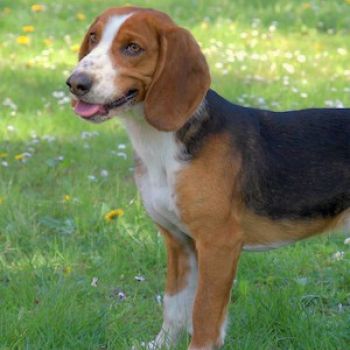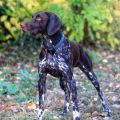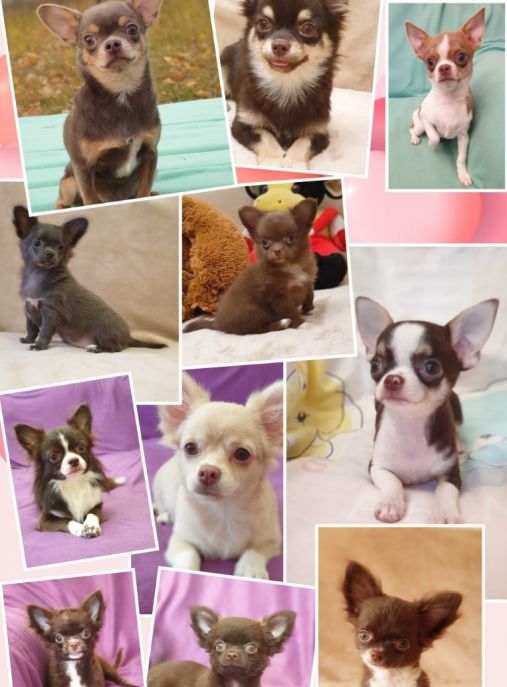The German Hound, also known as the Deutsche Bracke, is a versatile and highly skilled dog breed that hails from Germany. With its distinctive appearance and exceptional hunting abilities, the German Hound has gained popularity not only in its native country but also around the world. This breed is known for its exceptional scenting skills, endurance, and loyalty, making it a valuable asset for hunters and families alike.
The history of the German Hound can be traced back to the Middle Ages, where it was developed by crossing various scent hounds. The breed's ancestors include the St. Hubert Hound, Bloodhound, and the Swiss Hound. These dogs were selectively bred to create a versatile hunting dog that could track and chase game over long distances.
According to the FCI (Fédération Cynologique Internationale) typology, the German Hound belongs to Group 6: Scenthounds and Related Breeds. Within this group, it falls under Section 1.2: Medium-sized Hounds. This classification highlights the breed's exceptional scenting abilities and its medium-sized stature.
German Hounds are primarily bred for hunting purposes. They excel in tracking and trailing game, particularly hare and deer. Their keen sense of smell, coupled with their endurance and agility, allows them to navigate various terrains and climates with ease. These dogs are highly valued by hunters for their ability to work independently and their unwavering determination in pursuing their quarry.
In terms of physical characteristics, the German Hound is a medium-sized breed with a well-proportioned body. Males typically stand between 48-55 centimeters (19-22 inches) at the shoulder, while females are slightly smaller, ranging from 45-52 centimeters (18-20 inches). The breed's weight ranges from 20-25 kilograms (44-55 pounds), with males being slightly heavier than females.
The German Hound has a distinctive appearance, characterized by a strong, muscular body and a noble expression. Its head is well-proportioned, with a slightly domed skull and a well-defined stop. The breed's eyes are medium-sized and dark, exuding an intelligent and alert expression. The ears are long, hanging close to the head, and the tail is set high and carried with a slight curve.
One of the most notable features of the German Hound is its short, dense coat. The breed's coat is typically tricolor, consisting of a black saddle, tan markings on the head and legs, and white on the chest, neck, and tail tip. This coloration allows the dog to blend in with its surroundings while hunting.
In terms of temperament, the German Hound is known for its loyalty, intelligence, and strong work ethic. These dogs are highly trainable and eager to please their owners. They form strong bonds with their families and are generally good with children and other pets when properly socialized. However, due to their strong hunting instincts, caution should be exercised when introducing them to smaller animals.
The German Hound has a life expectancy of around 12-14 years, which is relatively long for a medium-sized breed. However, like all dogs, they are prone to certain health issues, including hip dysplasia, ear infections, and bloat. Regular exercise, a balanced diet, and routine veterinary care are essential to ensure the overall well-being of this breed.
In conclusion, the German Hound is a versatile and highly skilled breed that excels in hunting and tracking. With its exceptional scenting abilities, endurance, and loyalty, it has become a beloved companion for hunters and families alike. Its distinctive appearance, medium-sized stature, and tricolor coat make it easily recognizable. If you are looking for a dedicated and hardworking dog with a strong sense of loyalty, the German Hound may be the perfect breed for you.
The German Hound, also known as the Deutsche Bracke, is a breed of scent hound that originated in Germany. These dogs are known for their exceptional hunting skills and their loyal and friendly nature. With their distinctive appearance and unique character traits, German Hounds make wonderful companions and working dogs.
In terms of their character, German Hounds are intelligent, courageous, and highly driven. They have a strong sense of smell and an innate ability to track scents, making them excellent hunting dogs. They are known for their determination and perseverance in tracking game, which makes them highly valued by hunters.
Despite their hunting instincts, German Hounds are also known for their gentle and friendly nature. They are typically good with children and other pets, making them a great choice for families. However, it is important to note that early socialization is crucial to ensure they develop good behavior around other animals and people.
When it comes to training, German Hounds are generally eager to please and quick learners. They respond well to positive reinforcement techniques such as treats, praise, and play. However, it is important to establish yourself as the pack leader and maintain consistent training methods to prevent any stubbornness or dominance issues.
Exercise is essential for German Hounds as they have a high energy level. They require regular physical activity to keep them mentally and physically stimulated. Daily walks, jogging, or engaging in activities such as agility training or scent work are ideal for these dogs. Without adequate exercise, German Hounds may become bored and exhibit destructive behavior.
German Hounds are known for their distinctive appearance. They have a well-proportioned body with a muscular build. Their head is elongated with a slightly domed skull and a well-defined stop. They have dark, expressive eyes and long, drooping ears. The breed's coat is short, dense, and weather-resistant, which helps protect them during hunting expeditions.
When it comes to grooming, German Hounds are relatively low maintenance. Their short coat requires regular brushing to remove loose hair and keep it looking neat. Bathing should be done as needed, typically every few months, to keep their coat clean and healthy. Additionally, regular dental care, nail trimming, and ear cleaning are essential parts of their grooming routine.
In conclusion, German Hounds are intelligent, loyal, and friendly dogs with a strong hunting instinct. They make excellent companions and working dogs for those who can provide them with the necessary exercise, training, and mental stimulation. With proper socialization and consistent training, German Hounds can thrive in various environments and become cherished members of any family.
The German Hound, also known as the Deutsche Bracke, is a versatile and intelligent breed that requires proper care to ensure their well-being and happiness. Here is an extensive description of the recommended care for German Hound dogs, including tips on what to do and what not to do:
1. Exercise: German Hounds are active dogs that require regular exercise to maintain their physical and mental health. Aim for at least 60-90 minutes of exercise daily, including brisk walks, jogging, or playing fetch. Engaging in activities that stimulate their natural hunting instincts, such as scent work or tracking, can be highly beneficial.
2. Mental Stimulation: These dogs are intelligent and thrive on mental challenges. Provide them with puzzle toys, interactive games, and obedience training sessions to keep their minds sharp and prevent boredom. Mental stimulation is crucial to prevent destructive behaviors that may arise from boredom.
3. Grooming: German Hounds have a short, dense coat that requires minimal grooming. Regular brushing with a soft bristle brush or a grooming mitt will help remove loose hair and keep their coat shiny. Bathing should only be done when necessary, as excessive bathing can strip their coat of natural oils.
4. Dental Care: Like all dogs, German Hounds need regular dental care. Brush their teeth at least two to three times a week using a dog-specific toothbrush and toothpaste. Regular dental check-ups with a veterinarian are also recommended to ensure good oral health.
5. Nutrition: Provide your German Hound with a balanced and high-quality diet that meets their nutritional needs. Feed them a diet formulated for medium to large-sized breeds, and consider their age, activity level, and any specific dietary requirements. Avoid overfeeding to prevent obesity, which can lead to various health issues.
6. Socialization: German Hounds are generally friendly and sociable dogs. Early socialization is crucial to ensure they grow up to be well-rounded and confident adults. Expose them to various people, animals, and environments from a young age, and enroll them in puppy socialization classes to help them develop good social skills.
7. Health Care: Regular veterinary check-ups are essential to monitor your German Hound's overall health and detect any potential issues early on. Vaccinations, parasite prevention, and routine examinations should be part of their healthcare regimen. Additionally, be aware of breed-specific health concerns such as hip dysplasia and ear infections, and take necessary precautions.
8. Training: German Hounds are intelligent and eager to please, making them relatively easy to train. Use positive reinforcement techniques such as treats, praise, and rewards to motivate and encourage good behavior. Consistency, patience, and firmness are key to successful training sessions.
What NOT to do:
1. Neglect exercise: German Hounds are an active breed, and insufficient exercise can lead to behavioral problems and obesity. Avoid confining them to a small space for extended periods without exercise.
2. Use harsh training methods: These dogs respond best to positive reinforcement training methods. Avoid using punishment or harsh techniques as it can damage their trust and hinder their learning.
3. Overfeed: German Hounds have a tendency to gain weight if overfed. Avoid free-feeding and stick to a regular feeding schedule with appropriate portion sizes to maintain a healthy weight.
4. Isolate: German Hounds are social dogs that thrive on human companionship. Avoid leaving them alone for long periods, as it can lead to separation anxiety and destructive behaviors.
5. Neglect dental care: Poor dental hygiene can lead to various health issues. Neglecting regular dental care can result in dental diseases, bad breath, and discomfort for your German Hound.
In conclusion, German Hounds are wonderful dogs that require proper care, exercise, mental stimulation, and socialization to thrive. By following these tips and avoiding common mistakes, you can provide your German Hound with a happy, healthy, and fulfilling life.
The German Hound, also known as the Deutsche Bracke, is a breed of scent hound originating from Germany. These dogs are known for their exceptional hunting abilities and distinctive appearance. When it comes to their color, the German Hound typically showcases a striking combination of black, tan, and white markings.
The primary color of the German Hound is black, which serves as the base color for most of their body. This deep, rich black hue covers the majority of their coat, creating a stunning contrast against their other markings. The black coloration is most prominent on their back, sides, and upper body, giving them a sleek and elegant appearance.
Accompanying the black base color are tan markings that are distributed throughout the dog's body. These tan markings are usually found on the dog's face, legs, chest, and underside. The tan coloration is often a warm, earthy shade, ranging from a light tan to a deeper, reddish-brown hue. These tan markings add depth and dimension to the German Hound's coat, enhancing their overall aesthetic appeal.
In addition to the black and tan, the German Hound also possesses distinct white markings. These white patches are typically found on the dog's chest, paws, and the tip of their tail. The white coloration serves as a striking contrast against the black and tan, creating a visually appealing pattern that is unique to this breed.
The distribution and intensity of these colors may vary from one German Hound to another. Some dogs may have more extensive black markings, while others may have larger areas of tan or white. Each German Hound's coat pattern is unique, making them easily distinguishable from other breeds.
The German Hound's coat is short, dense, and weather-resistant, providing them with protection during their hunting expeditions. This coat texture also allows for easy maintenance, as it does not require excessive grooming. Regular brushing to remove loose hair and occasional bathing are usually sufficient to keep their coat in good condition.
Overall, the coloration of the German Hound is a captivating blend of black, tan, and white. This combination of colors not only enhances their physical appearance but also serves as a testament to their rich heritage as skilled hunting dogs. Whether in the field or as a beloved family companion, the German Hound's striking coat color is sure to turn heads and capture the hearts of all who encounter them.
The German Hound, also known as the Deutsche Bracke, is a medium-sized breed of scent hound originating from Germany. These dogs are known for their exceptional hunting abilities and are highly regarded for their keen sense of smell. When it comes to their health, German Hounds are generally considered to be a robust and healthy breed. However, like any other dog breed, they are prone to certain health issues that owners should be aware of.
One of the most common health concerns in German Hounds is hip dysplasia. This is a hereditary condition where the hip joint doesn't develop properly, leading to discomfort, pain, and eventually arthritis. Responsible breeders will conduct hip evaluations on their breeding dogs to minimize the risk of passing on this condition. Regular exercise, a balanced diet, and maintaining a healthy weight can help reduce the impact of hip dysplasia.
Another health issue that can affect German Hounds is ear infections. Due to their long, droopy ears, these dogs are more prone to developing infections caused by trapped moisture, dirt, or wax. Regular ear cleaning with a veterinarian-recommended solution can help prevent infections. Additionally, it's important to check their ears regularly for any signs of redness, swelling, or discharge.
Like many other breeds, German Hounds can also be susceptible to certain eye conditions such as cataracts and progressive retinal atrophy (PRA). Cataracts can cause cloudiness or opacity in the lens of the eye, leading to vision impairment or blindness. PRA, on the other hand, is a degenerative disease that gradually leads to loss of vision. Regular eye examinations by a veterinary ophthalmologist can help detect these conditions early on, allowing for appropriate management or treatment.
Maintaining good oral hygiene is crucial for the overall health of German Hounds. Dental issues, including periodontal disease, can lead to pain, tooth loss, and even systemic infections. Regular brushing of their teeth, feeding them dental-friendly treats, and scheduling professional dental cleanings can help prevent dental problems.
To ensure the overall well-being of German Hounds, it's important to provide them with regular exercise. These dogs have a high energy level and require daily physical activity to prevent obesity and keep them mentally stimulated. Long walks, jogging, or engaging in activities such as tracking or scent work can help meet their exercise needs.
Proper nutrition is also essential for maintaining the health of German Hounds. A high-quality, balanced diet that meets their specific nutritional requirements is crucial. Consultation with a veterinarian can help determine the appropriate diet for your dog's age, size, and activity level.
Regular veterinary check-ups are vital for early detection of any potential health issues. Routine vaccinations, parasite prevention, and annual blood work can help ensure the overall health and well-being of German Hounds.
In conclusion, German Hounds are generally a healthy breed, but they can be prone to certain health conditions such as hip dysplasia, ear infections, eye diseases, and dental issues. Responsible breeding practices, regular veterinary care, proper nutrition, exercise, and good grooming practices are essential for maintaining the health and happiness of these wonderful dogs.
The German Hound, also known as the Deutsche Bracke, is a medium-sized breed known for its exceptional hunting skills and strong physique. To maintain their overall health and well-being, proper nutrition plays a crucial role. A well-balanced diet is essential to meet their specific nutritional needs and support their active lifestyle.
When it comes to feeding German Hound dogs, it is important to provide them with high-quality dog food that is specifically formulated for their breed and age. Look for dog food that contains a good balance of protein, fats, carbohydrates, vitamins, and minerals. Opt for brands that use real meat as the primary ingredient, avoiding those with excessive fillers or artificial additives.
Protein is a vital component of a German Hound's diet as it helps in muscle development and repair. Look for dog food that contains high-quality sources of protein such as chicken, beef, or fish. It is recommended to feed adult German Hounds a diet that consists of around 18-22% protein, while puppies may require slightly higher levels for growth and development.
Fats are another important nutrient for German Hound dogs as they provide a concentrated source of energy. However, it is crucial to ensure that the fats come from healthy sources such as fish oil or chicken fat, rather than unhealthy fats like animal by-products or excessive vegetable oils. A moderate fat content of around 10-15% is generally suitable for this breed.
Carbohydrates are a source of energy for German Hound dogs, but they should be provided in moderation. Look for dog food that contains whole grains like brown rice or oats, as they provide more nutritional value compared to refined grains. Avoid dog food with excessive amounts of corn, wheat, or soy, as these ingredients can cause allergies or digestive issues in some dogs.
In addition to a balanced diet, German Hound dogs should have access to fresh water at all times. Hydration is crucial for their overall health and helps maintain proper organ function. Ensure that the water bowl is clean and filled regularly.
While it is important to provide a nutritious diet, it is equally crucial to avoid certain foods that can be harmful to German Hound dogs. Some foods to avoid include chocolate, caffeine, grapes, raisins, onions, garlic, and anything containing xylitol. These foods can be toxic to dogs and may cause serious health issues.
It is also important to avoid overfeeding German Hound dogs, as they have a tendency to gain weight if not properly monitored. Obesity can lead to various health problems, including joint issues and decreased lifespan. Follow the feeding guidelines provided by the dog food manufacturer and adjust the portion sizes based on your dog's activity level and body condition.
In conclusion, German Hound dogs require a well-balanced diet that meets their specific nutritional needs. Providing high-quality dog food with a good balance of protein, fats, and carbohydrates is essential for their overall health and well-being. Avoiding harmful foods and maintaining a healthy weight through portion control are equally important. By following these guidelines, you can ensure that your German Hound remains healthy, active, and happy for years to come.






